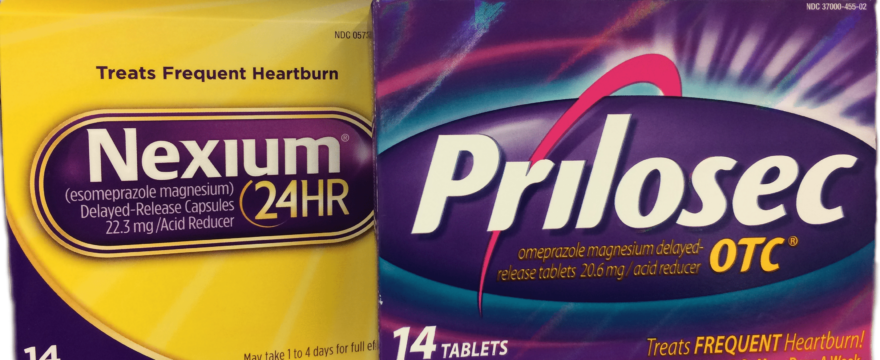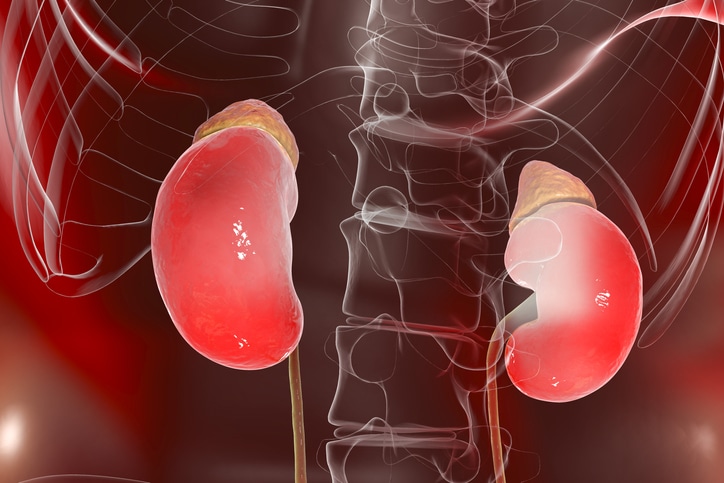Contents
- 1 Diving Into Nexium and Prilosec Lawsuits
- 2 What are Nexium and Prilosec Used For?
- 3 List of PPIs
- 4 Side Effects of Nexium and Prilosec
- 5 New Study Shows Long-Term PPI Use Increases Risk of Death
- 6 Risk of Chronic Kidney Disease From Taking Nexium or Prilosec
- 7 Nexium and Prilosec Lawsuits
- 8 Why are Patients Filing Prilosec and Nexium Lawsuits?
- 9 Dangers of Nexium and Prilosec
- 10 AstraZeneca and its Liability
- 11 How Do You Qualify for a PPI Lawsuit?
- 12 Prilosec, Nexium Class Action Lawsuit
- 13 Proton Pump Inhibitor MDL 2789 Lawsuits
- 14 Contact a Lawyer Handling Nexium and Prilosec Lawsuits
Diving Into Nexium and Prilosec Lawsuits
Prilosec and Nexium lawsuits blame the makers of PPIs for having failed to warn patients about the risk of contracting chronic kidney disease, kidney/renal failure, acute kidney injury, or acute interstitial nephritis. These are kidney issues that can require dialysis or lead to the death of patients.
Recent news reports have been covering the many health risks that come with PPIs. A new study suggests that some heartburn drugs, called proton pump inhibitors, that are used by millions of people in the United States are linked to a higher risk of death.
These drugs are available by prescription and over the counter and are used to treat ulcers, heartburn, and a variety of other gastrointestinal problems. Other recent studies have also associated PPIs to a number of potential health risks, including kidney disease, heart disease, bone fractures, stomach infections, dementia, and pneumonia.
PPIs like Nexium and Prilosec suppress excess acid in the stomach. Prescription formulas are generally taken for long periods by patients with severe conditions while lower-dose OTC formulas are approved by the US Food and Drug Administration for short-term use only.
What are Nexium and Prilosec Used For?
As mentioned already, proton pump inhibitors, or PPIs, are used to reduce acid production in the stomach. When you ingest a PPI, it works to block a stomach enzyme that produces H+/K+ ATPase, a stomach acid. Ulcers in the stomach, small intestine, and esophagus are then able to heal, and new ulcers are prevented from forming by the PPIs.
Some of the gastrointestinal disorders that are associated with excessive secretion of acid are:
- Indigestion (heartburn)
- Duodenitis/Gastritis
- Gastroesophageal reflux disease (GERD)
- Stomach or peptic ulcer
- Stress Ulcer Prophylaxis
- Dumping Syndrome
- Aspiration Pneumonia
- Zollinger-Ellison Syndrome
- Barrett’s Esophagus
PPIs are also used in combination with antibiotics to eradicate a bacterium called Helicobacter pylori that together with acid causes stomach and duodenum ulcers.
List of PPIs
Generally, prescription PPIs are used to treat ulcers, GERD, and inflammation of the esophagus and are not supposed to be taken for longer than 2 weeks (14 days) or more than 3 times a year.
Some of the common PPIs used to treat any of these conditions (their generic names are included) include the following:
- Nexium (esomeprazole)
- Prilosec (omeprazole)
- Prevacid (lansoprazole)
- Protonix (pantoprazole)
- Dexilant (dexlansoprazole)
- Aciphex (rabeprazole)
- Kapidex (dexlansoprazole)
- Zegerid (omeprazole/sodium bicarbonate)
Side Effects of Nexium and Prilosec
You might think that you are doing your body a favor by taking a PPI. They help in managing the symptoms of heartburn and make you feel better, right?
Plus, many PPIs are OTC and not prescription drugs, so you might not think that it is a big deal. However, like any other drug, PPIs can come with a range of side effects – some are mild, others serious.
In 2012, the FDA issued a warning to consumers about the potential for diarrhea that does not improve after people take PPIs and also a warning in 2010 about the increased possibility for wrist, hip, and spinal fractures. The latter was issued for patients who had received PPIs in high doses or used them for a year or longer.
Therefore, as a precaution, the FDA revised the Drug Facts section on labels. It has also already been mentioned earlier that the use of PPIs has been associated with increased risk for kidney disease, dementia, and other serious health conditions.
Some of the most common side effects of PPIs include the following:
- Diarrhea
- Headache
- Abdominal pain
- Constipation
- Flatulence
- Nausea
- Vomiting
- Rashes
- Fever
PPIs may increase the risk of Clostridium difficile colon infection. Prolonged use of the drugs also reduces Vitamin B12 (cyanocobalamin) absorption. On top of this, long-term PPI use has been linked to low levels of magnesium (hypomagnesemia).
When patients taking these drugs for long periods of time were analyzed, an increased risk of heart attacks was found. Therefore, it is extremely important for patients to use the lowest doses and the shortest treatment duration necessary for the condition that is being treated.
Other serious side effects that are associated with PPIs include:
- Reduced kidney function
- Reduced liver function
- Serious allergic reactions
- Toxic epidermal necrolysis
- Stevens-Johnson syndrome
- Erythema multiforme
- Pancreatitis
New Study Shows Long-Term PPI Use Increases Risk of Death
Researchers from Washington University School of Medicine in St. Louis recently conducted a study to find out if people who used PPIs were at greater risk of dying.
They had a question: If it is true that these drugs are linked to all of the aforementioned health issues, does that translate to an increased risk of mortality?
The researchers of the study examined medical records of about 275,000 PPI users and nearly 75,000 people who took H2 (histamine 2) blockers, which is another class of drugs for reducing stomach acid. The study concluded that there is an increased risk of death among those who use PPIs.
When patients taking H2 blockers were compared with those taking PPIs for 1 to 2 years, it was found that PPI users had a 50% increased risk of dying over the next 5 years.
Researchers said that because they are readily available, people think that they are safe. But they should keep in mind that taking these drugs comes with real risks, especially when they are consumed for long periods of time.
Although the recommended treatment period for most PPIs is short – for instance anywhere between 2 to 8 weeks for ulcers – many people take the drugs for months or even years. People are often prescribed these drugs for a sound medical reason, but then physicians do not tell them when to stop it and patients just continue to get refill after refill.
The researchers of the study said that there should be periodic reassessments as to whether it is required for people to be on the drugs. In most cases, people do not need to be on PPIs for a year, or more than that.
The same chemical compounds in prescription PPIs are present in OTC ones, just at lower doses, and there is no way to determine the exact period of time that people should stay on them.
The FDA recommends not taking PPIs for more than 4 weeks before consulting a doctor.
Risk of Chronic Kidney Disease From Taking Nexium or Prilosec
While studies of the use of PPIs have found increased risks in a number of different medical issues, including pneumonia, strokes, bone fractures, dementia, and certain infections, many studies have also examined the use of these drugs and the risk of kidney problems.
This includes studies that have looked at the association with chronic kidney disease (CKD) that is defined by the National Institutes of Health as any condition that results in a reduced function of the kidneys over a period of time. It may take years for CDK to develop and can cause ESRD, or end-stage renal disease. Patients who develop this disease require dialysis or a kidney transplant to survive.
A study that examined the use of PPIs and the risk of CKD found that people who were on PPIs had a statistically significantly higher risk of developing the disease when compared with people who were not on the drugs. The study also linked a higher risk of developing chronic kidney disease with twice-daily dosing compared to once-daily dosing.
It was one of at least three studies that were published in 2016 that drew a conclusion between proton pump indicators and CKD. Another of these studies found that there was a statistically significant increase in the risk of developing CKD and death for subjects who used these medications.
The study concluded that there was a need for better education among health care providers about the potential side effects of PPIs like Nexium and Prilosec.
A third study found that patients using PPIs had a statistically significant increase of 96% in the risk of ESRD and a statistically significant increase of 28% in the risk of CKD compared to patients using H2 blockers for acid-related indications.
As already mentioned, H2 blockers are a different class of drugs that are used to reduce acid in the stomach and includes brand-name products such as Pepcid AC, Tagamet, and Zantac, to name a few.
Nexium and Prilosec Lawsuits
The most recent data from the United States Judicial Panel on Multidistrict Litigation reveals that there are over 4,200 lawsuits pending against Nexium, Prilosec, and other proton pump inhibitors. Nexium and Prilosec are two of the most common OTC and prescription drugs used to treat frequent heartburn.
These and other PPIs, like Prevacid, have recently been at the center of a large number of lawsuits as consumers suffer kidney complications such as kidney injury, chronic kidney disease, and acute interstitial nephritis, which is an extremely serious condition that can result in kidney failure.
Why are Patients Filing Prilosec and Nexium Lawsuits?
Also known by its generic name omeprazole, Prilosec is a PPI developed by AstraZeneca to block excess acid in the stomach from flowing into the esophagus and leading to painful heartburn.
The delayed-release drug with omeprazole as its active ingredient was the first of its kind that the FDA approved in 1989 for prescription use. In 2003, it also became the first in its class to be approved by the FDA under the name Prilosec OTC for over-the-counter sale.
A second-generation drug for heartburn manufactured by the same company, Nexium was approved by the FDA and introduced to the market in 2001. AstraZeneca used esomeprazole instead of omeprazole – both ingredients are very closely related chemically.
According to reports, the drug was likely developed by the manufacturer to stay in the billion-dollar industry for heartburn medications and maintain profits, because, in 2002, their patent for Prilosec ran out.
Nexium and Prilosec are commonly used to treat the following conditions:
- Gastric ulcers
- Gastroesophageal reflux disease (GERD) or acid reflux
- Erosive esophagitis
- Duodenal ulcers
- Zollinger-Ellison syndrome (long-term treatment)
While originally available only by prescription, the Prilosec formula was changed by AstraZeneca for the use of omeprazole magnesium in the making of Prilosec OTC used in the treatment of frequent and recurrent heartburn. Patients are required to take the tablets over the course of 14 days so that heartburn will gradually improve and they can repeat it every 4 months. Prilosec OTC is marketed by Procter & Gamble.
Nexium24HR, the OTC version of Nexium, was not available until 2014. As with Prilosec, its formulation was changed to esomeprazole magnesium and the drug can now also be used with the same treatment course as the OTC version of Prilosec. Nexium OTC is marketed by Pfizer Inc.
Initially, AstraZeneca warned consumers of some potential side effects that came with Nexium and Prilosec, such as diarrhea, headache, dizziness, nausea, vomiting, stomach pain, or allergic reactions in some people. However, as the drug became more popular among consumers, researchers conducted studies and found that there were far more serious risks than originally thought.
Dangers of Nexium and Prilosec
Each year, millions of people in the US rely on Nexium and Prilosec to treat frequent heartburn and other conditions. However, in the last several years, in particular, there have been a number of studies that have been published about the serious side effects of Nexium, Prilosec and their main ingredients.
Around 2010, there were a number of studies that came out, indicating an increase in the risk for bone fractures in the wrist, hip and spine when the drugs are used over a prolonged period of time.
Researchers were divided when it came to the evidence, and it was ultimately determined by the FDA a year later that people who require only a low dose of the PPI over a period of one year or less are not at risk and there was no need to add an additional safety warning at the time. However, even more, serious and dangerous side effects have come to light in recent years.
Some of the dangerous side effects of Nexium and Prilosec include:
- Short-term kidney injuries and problems
- Low magnesium levels
- Acute interstitial nephritis (AIN)
- Dementia
- Heart attack
- Stroke
A study in 2016 that featured in JAMA Internal Medicine stated that nearly 11,000 participants used Prilosec and other such PPIs. These PPI users were found to have a 20% to 50% higher risk of chronic kidney damage compared to people who did not use PPIs.
Chronic kidney disease can progress over time and decrease kidney function severely, which in turn can potentially result in kidney failure and the need for a kidney transplant.
Additional serious health effects have been found in other studies. According to one recent study, Nexium and Prilosec could result in an increased risk of gastric cancer. Researchers found that patients with previous stomach infections had more than double the risk.
It has also been determined by other studies that there is a 21% increase in the overall risk for stroke and an increase of upwards of 21% for a heart attack for those who use this medication, especially with long-term use. The regular use of omeprazole has even attributed to increasing the risk of seniors developing dementia by more than two times.
AstraZeneca and its Liability
As with many other lawsuits against manufacturers of drugs, plaintiffs allege that AstraZeneca failed to conduct proper tests for side effects and appropriately warn healthcare providers and consumers about the potential health risks associated with Nexium and Prilosec.
While new warnings released by the FDA in correlation with a number of the studies mentioned above, both drugs continued to be marketed heavily by AstraZeneca, even to the point where there was an apparent shortage of the OTC version of Prilosec in the early 2000s.
As Prilosec was one of the best-selling drugs of AstraZeneca and accounted for several billions of dollars of revenue annually, the company continued to falsely advertise the drug’s effectiveness and safety. In 2002, when patent protection was lost, they continued with their deception by working to turn Prilosec consumers to their next generation drug, which was Nexium.
AstraZeneca marketed to consumers directly, claiming that Nexium – which had the same severe side effects as Prilosec – was more effective and safer than Prilosec. The company also allegedly bribed Medco, the health company, into advertising and discounting the newer medication in order to boost sales.
This resulted in AstraZeneca having to make a payment of a whopping 7.9 million dollars to the US Department of Justice for Nexium and Prilosec kickback scheme.
How Do You Qualify for a PPI Lawsuit?
If you have used Prilosec OTC, Nexium, Nexium 24HR, or Prilosec, and as result suffered serious side effects such as kidney damage, you stand eligible to file a claim against the manufacturer. It is extremely important to consult a Nexium lawyer or Prilosec lawyer soon after you sustain your injury so that you can receive a free case review and explore your options for filing a lawsuit.
With the help of an experienced lawyer, you can get the guidance you need to go through the whole claim process and make sure that you obtain the compensation you deserve for your injuries.
The majority of lawsuits involving Prilosec and Nexium, as well as claims against other similar medications for heartburn, are being handled through a process of multidistrict litigation. However, there are also several class action lawsuits that have been filed against AstraZeneca over injuries that PPI s such as Prilosec and Nexium have caused.
Prilosec, Nexium Class Action Lawsuit
AstraZeneca settled a class action lawsuit in 2015, which entailed Prilosec and Nexium, two of their popular heartburn medications. Along the same lines as the kickback scheme the company had with Medco, consumers claimed that the manufacturer was making attempts to boost sales of Nexium as their Prilosec patent ran out. The drugs are nearly chemically identical, but Nexium cost a lot more.
According to the class action lawsuit, a deceptive marketing strategy was created by the drug company to try and make Prilosec and Nexium “evergreen” and manipulate their own bottom line.
The case ended with a $20 million Prilosec lawsuit settlement that was paid out to the plaintiffs. Meanwhile, thousands of people have filed additional lawsuits against AstraZeneca and other manufacturers of PPIs in state and federal court over the severe side effects that are caused by these medications.
Proton Pump Inhibitor MDL 2789 Lawsuits
Several attempts were made to transfer these PPI lawsuits to a singular multidistrict litigation (MDL), which allows for a special federal process for streamlining and speeding up the handling of these cases. The US Judicial Panel on Multidistrict Litigation initially denied the motion to combine 39 federal lawsuits against a number of different manufacturers of PPIs into a single MDL in February 2017.
However, as the number of cases increased. The panel later reconsidered and MDL 2789 was officially formed in August 2017.
Judge Claire Cecchi and Judge Mark Falk are overseeing the Proton Pump MDL 2789 in the United States District Court of New Jersey. 161 cases were transferred when the MDL formed initially. As of May 2018, 4,248 lawsuits are pending and bellwether trials will be chosen and scheduled soon to begin the litigation process.
Contact a Lawyer Handling Nexium and Prilosec Lawsuits
If you or a loved one has suffered kidney damage or been diagnosed with chronic kidney disease, or other serious health issues, as a result of using PPIs like Prilosec or Nexium, you should contact a lawyer to discuss your options. After reviewing your case, your lawyer will help determine the best course of action, explain the entire legal process and protect your rights.
If the lawyer takes your case, they will attempt to make sure that the drug manufacturer is held legally liable for your injuries and damages, and that you receive fair, financial compensation for the ordeal you have gone through.
While you cannot go back in time and undo the devastating impact that the side effects of these medications have had on your life, you may be able to get compensation to help with medical bills and other expenses you incur as a result of the side effects associated with Nexium or Prilosec.
To contact a lawyer handling these lawsuits, please fill out the form below for a Free Case Evaluation.







